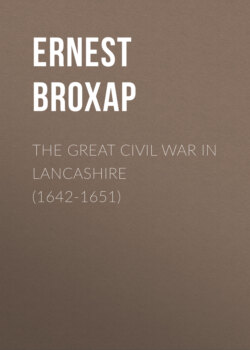The Great Civil War in Lancashire (1642-1651)

Реклама. ООО «ЛитРес», ИНН: 7719571260.
Оглавление
Ernest Broxap. The Great Civil War in Lancashire (1642-1651)
The Great Civil War in Lancashire (1642-1651)
Table of Contents
PREFACE
AUTHORITIES
INTRODUCTION
Footnote
CHAPTER I. Preliminaries.—Petitions.—Seizure of Magazines.—The Array and the Militia.—First Skirmish at Manchester
Footnote
CHAPTER II. The Leaders on Both Sides
Footnote
CHAPTER III. The Siege of Manchester
Footnote
CHAPTER IV. First Operations of the Manchester Garrison. Capture of Preston
Footnote
CHAPTER V. The Crisis. January to June, 1643
Footnote
CHAPTER VI. Remaining Events of 1643; and the First Siege of Lathom House
Note on the Site of Lathom House
Footnote
CHAPTER VII. Prince Rupert in Lancashire
Footnote
CHAPTER VIII. The End of the First Civil War
Footnote
CHAPTER IX. The Second Civil War. The Scots in Lancashire; Battle of Preston
Footnote
CHAPTER X. The Last Stand. Battle of Wigan Lane. Trial and Death of the Earl of Derby
Footnote
INDEX
MANCHESTER UNIVERSITY PUBLICATIONS
ANATOMICAL SERIES
CELTIC SERIES
CLASSICAL SERIES
ECONOMIC SERIES
EDUCATIONAL SERIES
ENGLISH SERIES
HISTORICAL SERIES
MEDICAL SERIES
PHYSICAL SERIES
PUBLIC HEALTH SERIES
THEOLOGICAL SERIES
LECTURES
Celtic Series
Economic Series
Historical Series
Medical Series
Biological Series
Publications of the John Rylands Library issued at the University Press
Отрывок из книги
Ernest Broxap
Published by Good Press, 2021
.....
It might have been expected that the affray in Manchester would be followed by further hostilities; but this was not the case, and two months elapsed before fighting really began in Lancashire. The intervening time was spent in active preparations by both sides; of the two the royalists at first appeared to have the advantage. Manchester had declared for the Parliament, but there was not much of the county which that party could rely upon, and even Manchester was not unanimous. Perhaps the majority of the crowd in the streets on July 15 were not anti-royalists.[23] The immediate outcome of the affray was that proceedings were begun against Mr. Tyldesley, who was reported to have killed Perceval, and by the other side against Stanley, Birch and Holcroft. Parliament stopped both actions. It was Birch who reported the affair to the House of Commons, and the committee named to deal with Commissions of Array was asked to consider it.[24]
In the following month there was a prospect of Lancashire being made the centre of the Royalist operations. Several places were considered for the raising of the royal standard, and the Earl of Derby suggested Warrington as suitable. He promised to raise at once 3000 foot and 500 horse, and within three days to make up their number to 10,000 men. After a few days' consideration Strange was sent back to Lancashire to make preparations, but in his absence the place was altered to Nottingham. It is suggested that court jealousy of Strange was responsible for the alteration.[25] Whatever the reason, however, Strange's loyalty was unwavering. He returned to Lancashire, and on August 17 dated from Lathom a warrant to all knights, freeholders and others able to bear arms (popish recusants excepted) to assemble at Preston on August 23. A week later Lady Strange wrote to her cousin, Prince Rupert, on his arrival in England, asking him to send a few troops of horse into Lancashire for a few weeks to assist in raising foot. Clarendon says that Strange was looked upon 'as of absolute power over that people,' and as yet there seems to have been no doubt at Lathom that this was the case.[26] Strange joined the King at Shrewsbury with three troops of horse and three regiments of foot. Lord Molyneux raised two regiments, one of horse and one of foot, and other Lancashire royalists contributed to the main royal army in a lesser degree. This draining of Lancashire of royalist troops, a process which was continued later, was to have a disastrous effect on their cause within the county.
.....